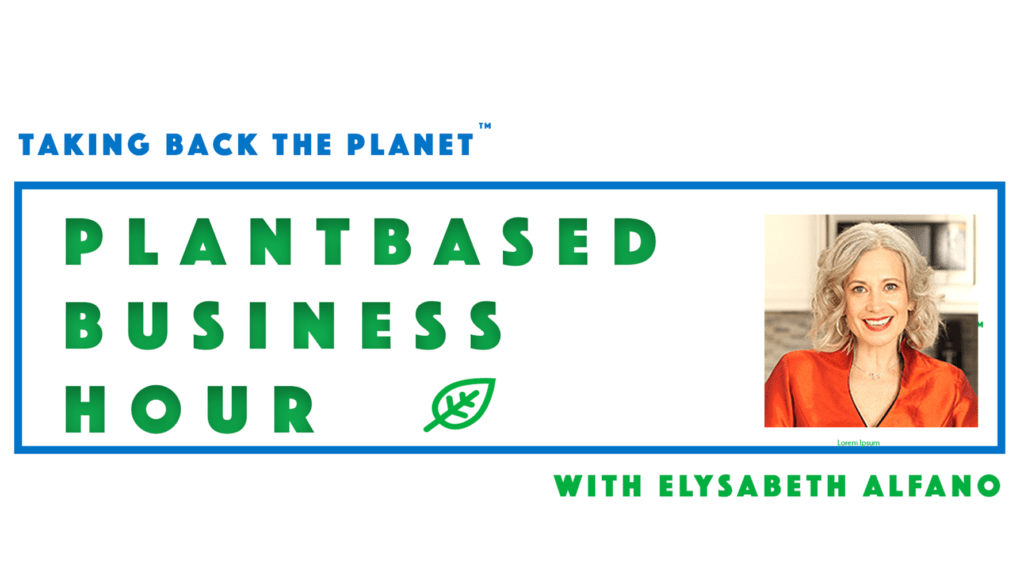
Cellular Meat? Maybe you have been hearing about this lately. Find out what it is and what are the newest advancements in cellular meat. Hear from the founders leading the way. Patricia Bubner of Orbillion, Nieves Martinez Marshall of Novel Farms, Benjamina Bollag of HigherSteaks, and Stephanie Michelsen on Jellatech join me on the Plantbased Business Hour.
Specifically, we discuss
- What each founder makes in cellular agriculture and how they make it,
- What are the inputs and media they use to grow cell lines,
- What is the environmental footprint of cellular agriculture for land, water, time, chemical run-off, anti-biotics, hormones, etc.
- What are the time and quantity comparisons for analogue products,
- When will will there be price parity,
- What innovations can be made with cellular/cultivated meat that can’t be made with animal meat
- Is cellular meat ‘Frankenfood’ and will the consumer accept it,
- Food security as an issue of national security and stability and will governments support research for cultivated meat,
- Predictions for the next five years.
Elysabeth: I want to bring on my guest today, Nieves Martinez. She is the founder of Novel Farms. Thank you for being with me. And Stephanie Michelson, she is also the founder of Jellatech. I can’t wait to hear more about that and what that is. Patricia Bubner just went through a wonderful raise, so excited to have you here, the founder of Orbillion. And then Benjamina Bollag. She’s joining us from London and she is the founder of HigherSteaks.
There are a couple restaurants that are starting to have cellular meat around the globe. Even Kentucky Fried Chicken in Russia says that they’re going to have cellular meat on the menu. But what is it going to cost and how long is it going to take us to get there? So, of course, if it is going to cost hundreds of dollars, no one will do it. So when is cultivated/cellular meat going to get close to the actual price of meat?
Patricia Bubner: The goal is to bring the price down, but also, you know, it’s my favorite pet peeve. What is the true price of meat today? You know, if we look at the price at which people expect to buy meat, that’s ridiculous. That’s not what it costs to produce. The farmers don’t get a fair share and the animals, as you say, are suffering, right? So, I think there needs to be a wholistic discussion about how our food system should look and what part alternative proteins and plant-based solutions can take in there, and how we can make all of these cost efficient. Impossible Foods and also Beyond have done a great job with starting at a higher margin and then slashing the prices down. So I think that’s something that we will see in cell cultured meat, as well.
Benjamina Bollag: Yeah, and I think you also have to look at is it the price of cultivated meat as a stand alone or is it a price of a hybrid because you have various degrees and various amounts. Depending on the product, it will be more or less important. So if you’re doing certain meats, it will be very important to have a high percentage of cultivated meat versus if you’re doing a sausage or nugget, you don’t necessarily need that. And the proof is most of the plant-based alternatives are already pretty good.
Elysabeth: Well let’s talk about that. Do you see a blending of plant-based and cultivated? So a plant-based meat alternative, let’s say like a nugget with a cultivated fat.
Benjamina Bollag: There’s no question whether the first products will be this way. I think the question is which products will endure in the long term. So whether in the long term will it stay a hybrid, will it always be a hybrid, or at some point will you be looking at an eighty percent cultivated meat product?
Elysabeth: Interesting, then let me ask your perspective. I’ll go with Nieves and then Stephanie. Do you foresee that plant-based foods become obsolete?
Nieves Martinez: No, I don’t think so and mainly for the fact that, as we said in the beginning, cell-based meat is geared towards meat lovers, right? And plant-based is more for vegans and vegetarians because they don’t enjoy meat and they really love these plant-based alternative protein products. So I don’t see it as one or the other.
Elysabeth: But as we look to the market, Stephanie, how do you think it’s going to shake out? These are just guesses at this point, but how do you think it’s going to shake out and who’s going to have the lion’s share of the market? Is it cultivated or plant-based meat?
Stephanie Michelson: Ooh, that’s a very tough question. I think it depends on a lot of things. We’re so early on, like Patricia said, we’re at the beginning of this. So I think it will also be a question of the consumer and what their preferences are and, of course, just technology and how quickly we can do it. I think with cell-based it’s no longer a question of if, it’s how fast and how soon, right?
As for what will happen, that’s hard to say and when it comes to plant-based, I also think that if you think about things like tempeh and falafel, these are things that we don’t consider meat analogs but they are still kind of like a protein source. I think there can be opportunities for new products that we don’t even think about, like we don’t have to have veggies always imitate meat, right? They can stand on their own and that’s why I think they will always be there. Like Nieves said, they are delicious in their own way. And then hybrids are super exciting, too, to get these unique flavors, textures, and fats and things like that and just come up with new things, right? Because that’s what we can do now. We have this technology.
Elysabeth: I love that you say that because, of course, food is nostalgic for all of us and it brings up memories and feelings, but innovation is what we do. So when people say to me, “Oh, you know, we’ve never done that before” or “we shouldn’t do that. That’s something too new” I just think, are you going to put us in the back of the bus? Come on, the world is changing. That’s like saying, “Oh no, don’t use a computer, I really have to have a typewriter.” Who would do that?

New episodes are out every week. Never miss the Plantbased Business Hour or Minute. Subscribe on iTunes and Youtube, and sign up for the newsletter. Follow Elysabeth on Linkedin. Join the Plantbased Business Breakfast Thursdays at 9a PT on Clubhouse. For information on Plant Powered Consulting, click here.



